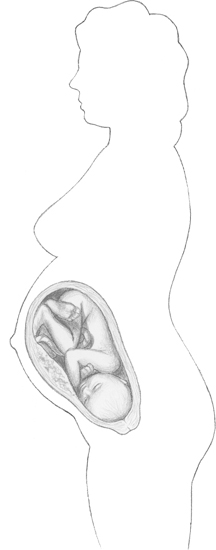1. How Big Is Your Baby?
Your baby weighs about 7¼ pounds (3.3kg).
Crown-to-rump length is about 14½ inches (36cm). The baby’s total
length is close to 20 inches (50.5cm).
2. How Big Are You?
Your weight should remain
between 25 and 35 pounds (11.4 and 15.9kg) gained until delivery.
If you measure from the pubic
symphysis to the top of the uterus, the distance is 14½ to 16 inches
(36 to 40cm). Measuring from the bellybutton, the distance is about 6½
to 8 inches (16 to 20cm).
3. How Your Baby Is Growing and Developing
Your baby continues to gain
weight. It doesn’t have much room to move. All the organ systems are
developed. The last organ to mature is the lungs.
Can Your Baby Get Tangled in the Cord?
You may have been told by friends not to
raise your arms over your head or to reach high to get things because
it may cause the cord to wrap around the baby’s neck. There doesn’t seem to be much truth to this old wives’ tale.
The term nuchal cord
refers to an umbilical cord wrapped around a baby’s neck. It occurs in
nearly 25% of all births. Nothing you do during pregnancy causes or
prevents this from happening. A tangled umbilical cord isn’t
necessarily a problem during labor. It only becomes a problem if the
cord is stretched tight around the baby’s neck or is in a knot. The
good news is this situation is not always dangerous for baby.
4. Changes in You
It would be unusual for you not
to be uncomfortable and feel huge at this time. Your uterus fills your
pelvis and most of your abdomen. It has pushed everything else out of
the way. By this time, you may want baby to be born because you’re so
uncomfortable.
5. How Your Actions Affect Your Baby’s Development
Feeding Your Baby
Feeding your baby is one of the most important tasks you will perform. The nutrition you give your baby now
will have an effect on the rest of his life. You want to give your baby
the best start nutritionally that you can. If you any have questions,
discuss them with your healthcare provider.
You may decide to breastfeed baby; it may
be the best nutrition you can give him. The baby receives more than
just breast milk from you. He will also receive important nutrients,
antibodies to help prevent infections and other important substances
for growth and development. However, you may choose not to
breastfeed—if you bottlefeed, you can still provide good nutrition for
your baby.
ACOG discourages elective delivery of a baby before the 39th week of pregnancy. The best time to deliver is between 39 weeks and one day before you reach 41 weeks.

Comparative size of the uterus at 39 weeks of pregnancy
(fetal age—37 weeks) with a baby that is close to full term.